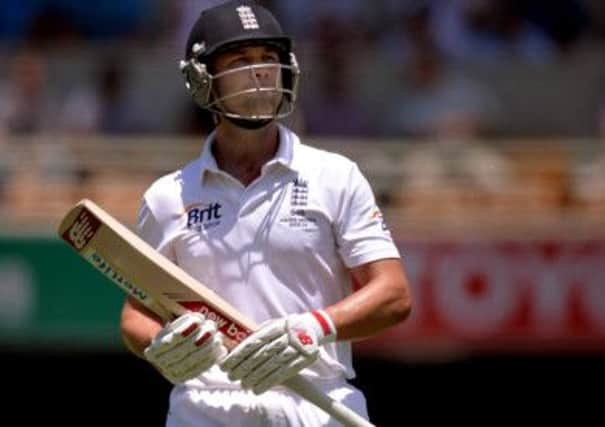Batsmen can feel it is them against the world


Whether it shows itself through stress, anxiety or depression, or a combination of all three, the effects of poor mental health are posing questions that sport’s governing bodies are gradually realising need tackling urgently.
The problem for sports authorities, though, is that they are dealing with a disease.
Advertisement
Hide AdAdvertisement
Hide AdIt is not like racism or homophobia, sport’s other great taboos, which involve their perpetrators making a choice.
Poor mental health, much like an addiction to gambling or alcohol, needs treating.
There is no outright cure. It is a problem that has to be managed by individuals and as a collective, it has to be understood and respected.
Gone are the days when a simple – and insulting – “pull yourself together” exhortation was deemed sufficient.
Advertisement
Hide AdAdvertisement
Hide AdMental health goes way beyond a mere flicking of a switch. Science contends that problems derive from a chemical imbalance in the brain, a theory that, if accurate, means the illness can not be overcome by sheer will power alone.
Jonathan Trott admitted yesterday that he needs help and time as he battles a “stress-related illness”.
Revealing his vulnerabilities during an Ashes series – the pinnacle of an English or Australian cricketer’s career – is a brave move.
He is the third English cricketer in the last few years to go public with his troubles, after Marcus Trescothick and Michael Yardy.
Advertisement
Hide AdAdvertisement
Hide AdTrescothick’s admission in the winter of 2005-06 was a watershed moment for mental health in sport. It made people sit up and take note that for all the glamour and the money, all the travel and the superstar status, our heroes are just as susceptible to mental health issues as the man in the street.
There have since been a number of high-profile cases. Robert Enke, Germany’s No 1 goalkeeper, took his life after a long, private battle against depression. His story tugged at the heart strings of the worldwide football community.
Closer to home, the death of Gary Speed united British football in grief and brought the issue of mental health to the top of sport’s agenda.
Having battled depression, Clarke Carlisle is crusading to raise awareness about its impact on the men and women of sport.
Advertisement
Hide AdAdvertisement
Hide AdThis is not to say Trott is suffering depression, but as respected sports psychologist Jon Finn points out, depression and stress can go hand in hand.
“Stress and depression are interlinked. Depression is fuelled by a multitude of stresses,” said Finn, who has his own company Tougher Minds, which works with a number of people from across sport.
“It can escalate very quickly.”
Sportsmen and women live their life in a goldfish bowl, their every-day highs and lows magnified beyond the comprehension of us regular folk.
In Trott’s case, his struggles were played out in front of tens of thousands of partisan Australia fans who, inspired by their team, are baying for English blood.
Advertisement
Hide AdAdvertisement
Hide AdIn that environment, if you are not at your strongest mentally, there is no hiding place.
“The role of the batsman can be very introverted,” added Finn.
“When you’re out there alone at the crease, it can feel like it’s you against the world.
“The brain can get into bad habits where you’re struggling to find positives.
Advertisement
Hide AdAdvertisement
Hide Ad“Cricketers have very, very demanding schedules. We can all empathise with the tough schedule and being away from home for a long time can have a negative effect on performance.
“What you have to also remember is that athletes live in the real world, they’re not just in a sporting bubble.
“They have families, relationships; we don’t know what’s going on in Trott’s life away from cricket.”
According to the Mental Health Foundation, one in four adults experience at least one diagnosable mental health problem in any one year.
Advertisement
Hide AdAdvertisement
Hide AdApplied to cricket, or team sports, that translates to nearly three members of an 11-man team who will suffer mental health issues.
Those numbers underline that mental fitness is just as important in a sportsperson’s make-up as their physical condition.
Cricket, like all sports, is wising up to the need to have a support network for its professionals and amateurs.
Sports psychologists are becoming an essential part of a backroom team or an individual star’s entourage. Sitting down and talking through mental issues is as important as an appointment with the physio.
Advertisement
Hide AdAdvertisement
Hide AdAt Yorkshire County Cricket Club, the mental aspect of the sport is something they focus on from an early age, with seminars for teenagers aged 15, 16 and 17 who are part of the club’s academy pathway.
What helps reinforce the importance of such programmes and psychologists is events like yesterday’s when a high-profile cricketer re-opens the debate on mental health with an admission that gets people talking.
Trott should be applauded for having the courage to admit he needs help.